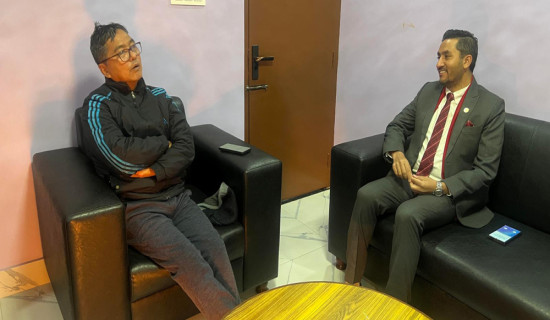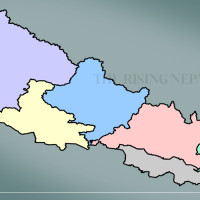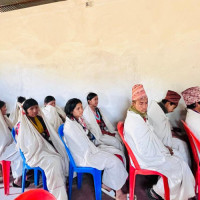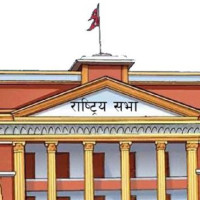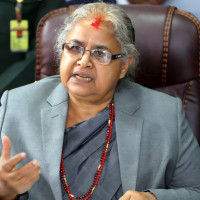- Wednesday, 7 January 2026
Employees should deliver responsively: Chief Secy
On June 15, 1951, the Public Service Commission was established in Nepal, marking the beginning of a formal employee selection process. Later, on September 7, 1956, the first Civil Service Act was introduced. In remembrance of this milestone, Nepal has begun observing Civil Service Day on September 7 (Bhadra 22) since 2004.
This year’s Civil Service Day is being celebrated under the theme ‘Five Years for 2030: Accelerating Public Service Delivery for a Sustainable Future.’
On the occasion, the Chief Secretary of the Government of Nepal, Eaknarayan Aryal, talked to Gorkhaptra, our sister publication.
Aryal entered the civil service in 1989 as a non-gazetted first class officer in Baitadi district. Over the years, he served as Chief District Officer (CDO) in various districts. He has also represented Nepal abroad as a Consul General and served as Secretary in the Ministry of Federal Affairs and General Administration, the Ministry of Home Affairs, and the Office of the Prime Minister and Council of Ministers. Today, he holds the country’s top administrative post as Chief Secretary.
Born in Sumre Khola of Putalibazaar Municipality-10, Syangja district, Aryal is the son of Chhabilal Aryal and Savitri Aryal. In an exclusive interview with Narad Muni Gautam and Ishwar Chandra Jha of Gorkhpatra, Aryal, shared his insights on the challenges, opportunities, and future direction of Nepal’s civil service. Excerpts:
Civil Service Day is being observed. On this occasion, as the guardian of civil servants, what would you like to say ?
The civil service is the most important pillar of public administration. Civil servants must work with dedication and professionalism. We carry the responsibility of serving citizens. Since the civil service is a mechanism that makes a special contribution to the nation’s prosperity, every employee must remain committed to fulfilling that role. The main objective is to perform one’s duties responsibly. The message of the 22nd Civil Service Day is exactly this.
There are complaints that civil administration is more process-driven and slow, but not results-oriented. What is your response ?
Citizens often face difficulties in service delivery, especially in offices related to transport, land revenue, taxation, and electricity. To address this, we have introduced technology-driven systems. Through the Nagarik App, citizens can learn in advance about services, fees, responsible officials, and required documents, so that once they visit the office, their work is completed immediately. While human behaviour sometimes causes grievances, we have also established the ‘Hello Sarkar’ system to receive complaints. Immediate action is taken based on the grievances, identifying why services were delayed, and gradually, improvements are being made. Compared to the past, the situation has improved.
No work can be delayed for more than seven days in ministries. Policy decisions that must pass through higher authorities are also required to be finalised within seven days. If not, it falls under the definition of irregularity. On this Civil Service Day, I would like to urge citizens that if they experience unnecessary delays or negligence, they may complain to the Chief District Officer, the ministry concerned, through Hello Sarkar, or directly to the secretary.
What efforts has the government made to boost morale and enhance the capacity of civil servants ?
Due to the country’s economic condition, we have not been able to fully meet staff needs or provide facilities at par international standards. However, we have tried to provide benefits and facilities according to the national capacity. Many employees feel that lower remuneration limits their ability to deliver as expected.
Yet, we must remember that the more citizens are satisfied, the more it contributes to economic prosperity. Development work progresses without obstruction, thereby supporting economic growth. With prosperity, employees can be provided with higher morale and better remuneration.
Despite limitations, there are provisions for pensions and medical treatment. The government is also raising morale by managing these facilities, regularly increasing allowances, and planning further increments. Friendly nations such as India, China, and Japan are assisting in capacity-building by offering training opportunities. Employees are sent for training based on available seats, and the knowledge they gain is integrated into service delivery. More work, however, still needs to be done, especially in the areas of capacity-building and social security.
What initiatives are being taken toward digitisation, e-governance, and smart administration?
Since becoming Chief Secretary, I have announced policies for faceless, cashless, and paperless services. Accordingly, government policies and programmes have been formulated. To achieve economic prosperity, we are prioritising employment, production, productivity, entrepreneurship, and technology-driven service delivery.
Today, services at all three levels -- local, provincial, and federal ¬-- are designed with technology in mind. Through the Nagarik App, citizens can access services. We have already made necessary policy and legal arrangements.
For institutionalisation, we have the immigration information system, separate software for foreign employment and passports, and a financial management system that can track revenues collected up to today. Accounting software is in place for all levels of government. These systems are being integrated with the National Identity Card, which is also linked to social security benefits delivered via banking channels across the country.
Nepal has taken significant leaps in technology, with digital access now reaching all 753 municipalities, although some remote wards still face issues. Employees’ mindset has also shifted toward providing services through technology. The challenge now is integrating these systems with one another. Once linked, governance will improve further, making services such as birth registration, death registration, personal records, and pension renewals accessible directly from home. We have already moved past paper-based administration; technology-driven governance is the way forward.
Do you have a roadmap to ensure fast and reliable services for citizens ?
Yes. The key is the use of technology, along with ensuring that employees understand the laws and procedures related to the services they provide. Offices must operate under clear procedures. For example, in the Kathmandu District Administration Office, you can now receive a citizenship certificate within half an hour. At the Passport Department, citizens can obtain passports the same day or the next day.
Some employees’ behaviour, however, tarnishes the reputation of the entire civil service. This must be controlled, and citizens also need to play a role in discouraging such practices.
Corruption is often linked to the bureaucracy. What are your thoughts ?
Corruption is a major social disease. The practice of relying on middlemen is widespread, which sometimes results in civil servants being blamed unfairly. In some cases, middlemen bargain on behalf of citizens, and when problems arise, employees are blamed. Politicians and other sections of society also influence this ecology. My clear view is that employees must keep their distance from such intermediaries.
We must strengthen our closeness with citizens. To ensure good governance, make services effective, and strengthen development administration, the role of civil society and citizens themselves is crucial.
What kind of orientation is needed for newly recruited employees to prevent corruption ?
We have the Staff College for training. The first requirement is an improvement in mindset, which must begin individually. Still, through policies and training, we regularly work to prevent irregularities. Many younger employees are already showing positive changes.
The Federal Civil Service Act is in the verge of implementation nearly a decade after the Constitution. How significant is this ?
After long discussions, the law is in the final stage, soon to reach the President for approval. With federalism, we introduced the Adjustment Act and adjusted staff accordingly, though many employees expressed grievances as they were forced into placements. Local and provincial governments have recruited employees, but career development pathways remain unclear. They also cannot draft laws that contradict the federal act due to constitutional restrictions. The new Federal Civil Service Bill addresses these uncertainties and, once approved, will pave the way for rules and implementation.
Recently, the provision that retired officials must complete a cooling-off period before political or diplomatic appointments has been endorsed. What is your view ?
I expressed my views in the State Affairs and Good Governance Committee of the House of Representatives. The Civil Service Act must comply with constitutional provisions. The National Assembly has already passed it, and it is now in the approval stage. Therefore, I will not comment further. This provision does limit how the government can utilise the knowledge and skills of retired employees.
People’s representatives at all three levels often complain that bureaucrats do not cooperate. What is your response ?
As I said earlier, development and service delivery cannot be handled by employees alone. No one has examined why the working environment for employees is obstructed. In some places, local representatives have mistreated employees, and in provinces too, certain behaviours have not been appropriate.
We failed to establish the principle that politicians and employees are two sides of the same coin. Politicians make laws and policies, while employees implement them. Even the Good Governance Act clearly defines roles. However, working environments in some ministries at the provincial and federal levels are shrinking, which is not a good sign.
Without cooperation between politicians and civil servants, prosperity cannot be achieved. Employees must understand that their duty is aligned with the nation’s prosperity, and politicians must also recognise this.
Finally, what is your message to civil servants on Civil Service Day ?
I extend best wishes and congratulations to all colleagues working in the civil and public service. Let us adopt new ways of working, act responsibly, make maximum use of technology, and solve citizens’ problems with a positive mindset. Citizen satisfaction is our highest duty.



